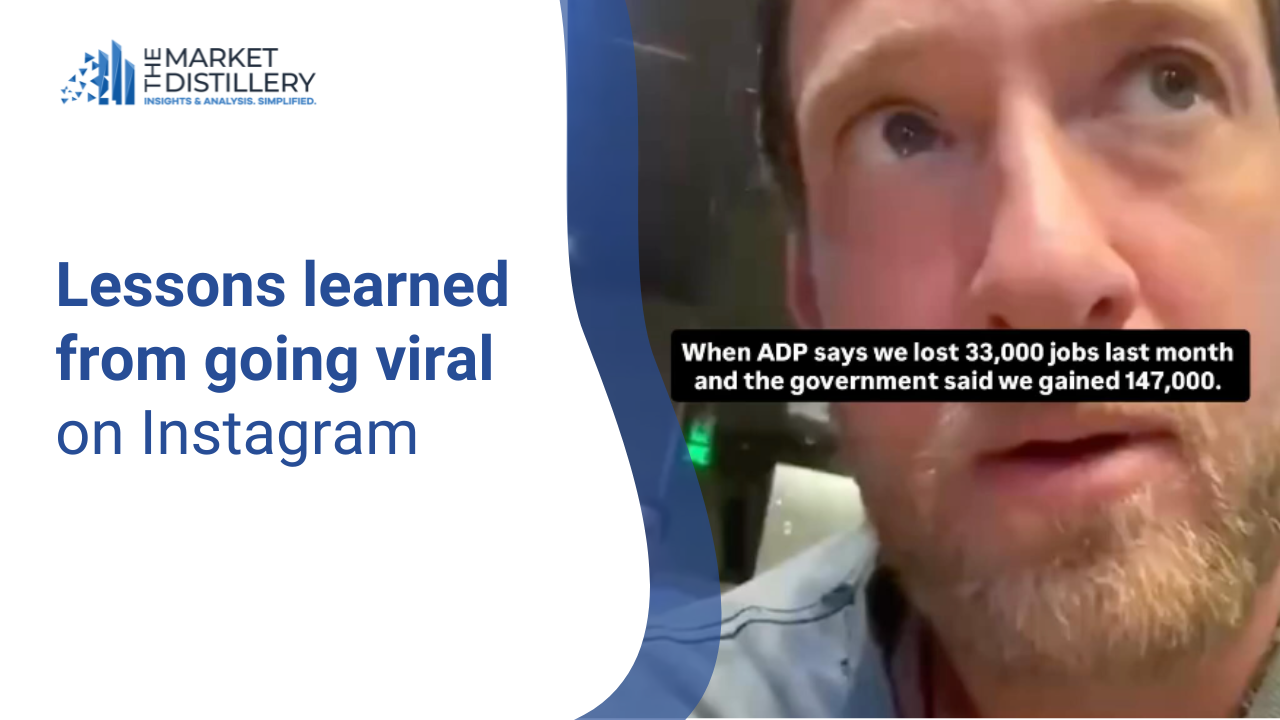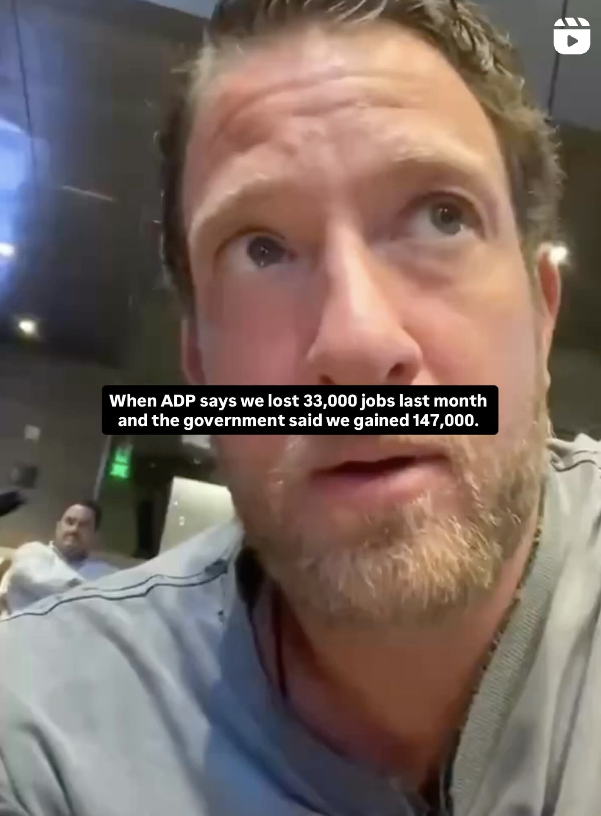Lessons learned from going viral on Instagram
Jul 13, 2025
My Instagram reel went viral. Here's what I learned. 📈
If you create content, chances are good every time you hit publish, you have dreams of the post going viral.
To specify, going viral means your content spreads throughout a social network and racks up a ton of views, comments, likes, saves, etc.
But is that really a good goal for your content?
And does going viral actually help your business?
Well, I had a post a couple weeks ago go viral and reach drastically more people than I normally do.
Here's what I learned...
The Reel: By the numbers. 📊
For reference, here's the reel that took off that we're discussing:
The viral reel was a video meme poking fun at the discrepancy between the two major jobs reports we got that month.
I used a clip of Dave Portnoy simply saying he has no words several times.
My caption was pretty neutral and primarily called out the confusion that comes from conflicting information like these reports.
And here are the major stats related to the reel (at the time of writing):
- Views: 308,077
- Accounts Reached: 223,841 (99.1% non-followers)
- Likes: 3,882
- Comments: 1,671
- Shares: 1,663
- Saves: 584
- New follows: 275
These stats are 100x my normal post.
Lessons For All of Us 🚀
Let's go over a few takeaways from this experience:
- 🤷♂️ The content that goes viral matters. Going viral on the wrong content doesn't really help your business.
Honestly, this reel got a lot of traction, but did very little to connect me with may target market: Realtors on Instagram. It was almost entirely random people who will never connect with my content or potentially be clients. Sure, I have 275 more followers, but odds are good they won't engage with my content beyond this reel. - 🎭 The internet feeds off extreme. Strong opinions or statements that create sides are more likely to go viral.
Even though I didn't put an extreme take in my caption, Instagram's algorithm figured out people would argue about the topic and pushed the content to people who likely have a track record of political arguments online. Also, many people were commenting directly to Dave Portnoy as if he made this post, which was an interesting phenomenon. The post was a topically timely, caused a lot of people to speak up with their opinions, and used a popular/polarizing person for the video. - 🎯 It's far better to create content for your target market than to create content for the masses in an attempt to go viral.
Given the option, I'd rather have a post really connect with 100 real estate agents in Northeast Florida that would interested in being part of my coaching group than hundreds of thousands of random people. Do you know who you want your content to reach? Going forward, be sure you're making content for the exact person you want to work with rather than trying to engineer something viral.
Obviously, going viral is better than the opposite, but most people probably put too much emphasis on trying to reach that outcome.
And it can be very easy if you get some traction like this to try to replicate the results by creating more divisive content to get views.
This is exactly what happens when people make a post that's negative about the real estate market or economy.
It gets fed into an echo chamber of negativity and the author loses all ability to think accurately because they're blinded by the views. Instead, they cherry-pick stats to make more content that creates fear, doubt, and conflict.
Then, the views pour in and they double down on the extreme takes until everything they put out says it's worse than 2008.
Unfortunately for them, that's far from actual reality.
And unfortunately for the public, they can't easily tell that it's not true.
So listen: going viral isn't all it's advertised to be.
If you can do it without losing your credibility, great!
But if you really want to use social media to grow your business, you'll be far better off defining your ideal client and making content that speaks directly to them.
Now, go out and connect with your people! 🚀
![]()
Dr. Alex Stewart
Founder
FAQ: Is Going Viral Good for My Business?
1. What does it mean for my business to go viral?
Going viral means that your content rapidly gains popularity and is widely shared across social media platforms, boosting brand awareness and engagement. Many times, it's a single piece of content that goes viral, rather than an the business itself.
2. How can a small business create content that goes viral?
To create viral content, focus on authentic storytelling, trending topics, and engaging visuals that resonate with your target audience. There are many creators on the social media platforms that create content that help optimize content for virality.
3. Can going viral negatively impact my small business?
Yes, going viral can have downsides, such as backlash or controversy that may harm your brand reputation if not managed properly. Additionally, going viral can overwhelm a business and lead to bad experiences for new customers.
4. How can I use social media marketing to achieve virality?
Each social media platform has different algorithms that determine how much content is pushed to users, but in general you should create entertaining/valuable content that resonates with people and encourage shares to maximize your reach.
5. What role does authenticity play in viral content?
Authenticity helps build trust with your audience, making them more likely to share your content and positively engage with your brand.
6. How can I measure the success of my viral marketing efforts?
Use analytics tools to track viewer engagement, shares, and conversion rates to assess the impact of your viral content on your business. Although, for most businesses, going viral doesn't actually help the business become more successful. Effective viral content should bring awareness, customers, and sales to your business to be considered successful.
7. Should I focus on short-term virality or long-term brand growth?
While short-term virality can boost immediate engagement, a sustainable marketing strategy should focus on long-term brand growth and customer loyalty. Most small businesses would benefit the most from consistent social media growth over one-time virality.
8. How can I scale my business after going viral?
Consider what moves you would make should your business go viral so that you have a plan. Leverage the increased brand awareness to deepen the connection with new followers. If you sell out of a product because it goes viral, use the scarcity to keep demand high.
Realtors: want to be confident discussing the market? 🚀
If you're like so many of the Realtors I meet, you know understanding the local market is one of the most important things you can do as a real estate agent.
Everyone asks "how's the market?" when you meet them and the way you respond either opens a door of opportunity or shuts it.
Most Realtors have the stats but don't know what to do with them. There's so much going on that it gets confusing quickly.
If this sounds like you, My Market Insiders coaching could be just what you need. It's part local market updates, part business strategy so that you can be clear about exactly what's happening in the market and how to use that expertise to attract your ideal clients.
Members rate it 9.8 out of 10 for value to their business and increase their confidence talking about the market by 24%.
Click the button below to learn more about the program and if it's right for you ⤵️


